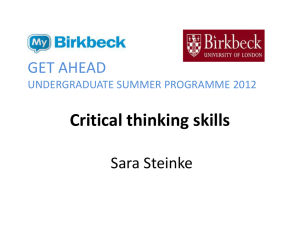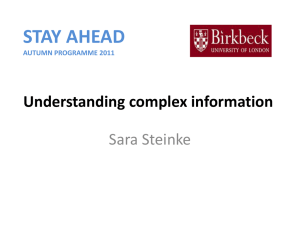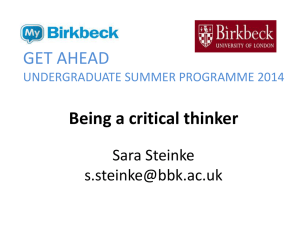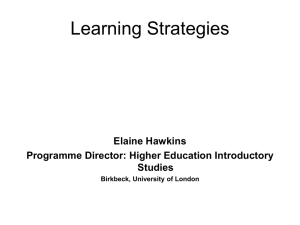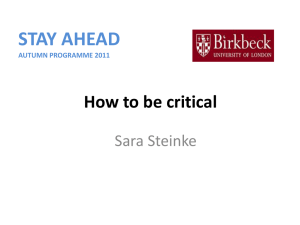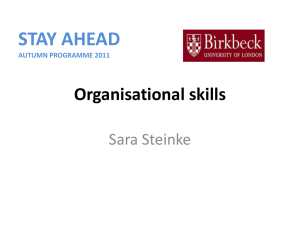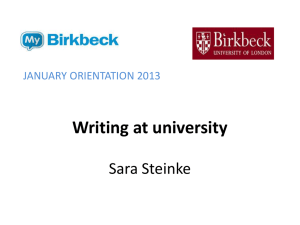Critical Thinking Skills
advertisement
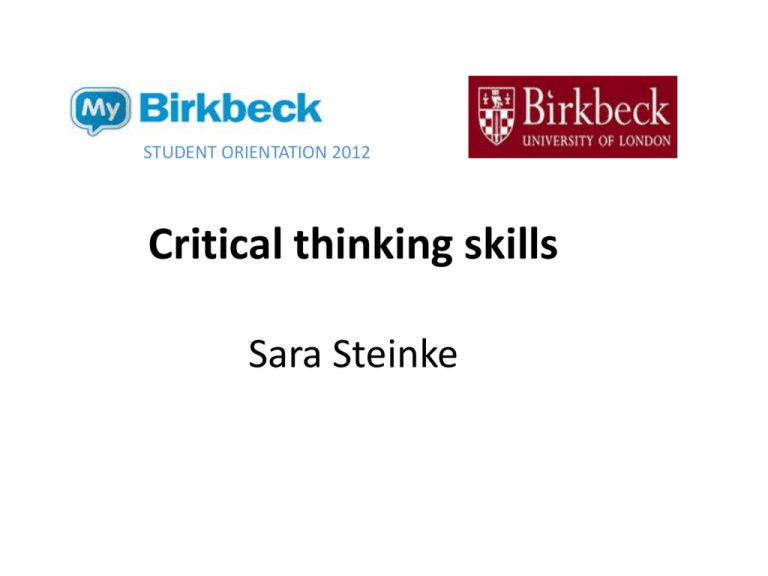
STUDENT ORIENTATION 2012 Critical thinking skills Sara Steinke Aims of the session • Recognise the value of your everyday critical reasoning skills for academic studies (known as a study skills audit) • Identify what is meant by analytical thinking at university • Reflect on the ways to translate your everyday critical reasoning skills into analytical thinking for your academic studies Why consider everyday critical reasoning skills? • Adult learners process a range of experiences, and skills that involve critical reasoning • These current qualities are of great value for university studies Tip: Everyday decisions are rarely straightforward. Similarly, analytical thinking at university is ‘messy’, topics are not seen as ‘black or white’. Think about the following a) Job opportunities /promotion What factors were involved in your decision to study a particular course at Birkbeck? b) Desire to return to learning c) Financial concerns d) Time constraints e) Course subject f) Other reasons Analytical thinking at university • Takes place across a variety of study skills – reading, note-taking, writing essays /reports, exams, revision, presentations • Involves thinking analytically about yours and other peoples work/ideas Tip: Actively engage with these activities. You will be constantly updating your study skills. Think about the following You have been asked to read an article in preparation for a lecture. What questions might you ask in order to undertake a critical reading of the article? 1. What is the main argument of the article? 2. What are the reasons given to justify the argument? 3. What evidence has been used? 4. What do you know about the author? 5. What audience is the author addressing? 6. What sources has the author used? Creating a critical thinking action plan 1. Write down the three most important aspects of critical thinking skills that you have learnt/thought about in this session? Why are they important to you? 2. Are there any areas for improvement in your critical thinking skills? If so, what are you doing to do to improve this aspect of your learning? Recap of the session • Undertaken a study skills audit of your everyday critical reasoning skills, and recognised their importance for your university studies • Introduced what is meant by analytical thinking at university – identify key arguments, awareness of reasoning, consider the evidence, knowledge about the author, think about the audience, knowledge of sources • Reflected on ways to translate your everyday critical reasoning into analytical thinking for your academic studies Cottrell, S. (2008) The Study Skills Handbook, 3rd Edition (London, Palgrave) chapter 12 ‘Critical analytical thinking’ pp.275-292 http://www.bbk.ac.uk/mybirkbeck/getahead-stay-ahead/skills/critical-thinking http://www.palgrave.com/skills4study/ mp3s.asp#Critical studyskills/course_timetable 5 minute interactive tutorial supporting this Student Cottrell, S. (2005) Critical Thinking Orientation programme Skills (London, Palgrave) http://www.bbk.ac.uk/mybirkbeck/ 12 minute audio file based on Cottrell’s Critical Thinking Skills book study skills workshops which deal with critical thinking skills – and other study skills – in greater detail http://www.bbk.ac.uk/mybirkbeck/ services/facilities/support/criticalthinking http://www.palgrave.com/skills4study/ studyskills/thinking/index.asp online resources on critical thinking skills available on the Birkbeck Library website helpful information on critical thinking skills on the Skills4Study website
